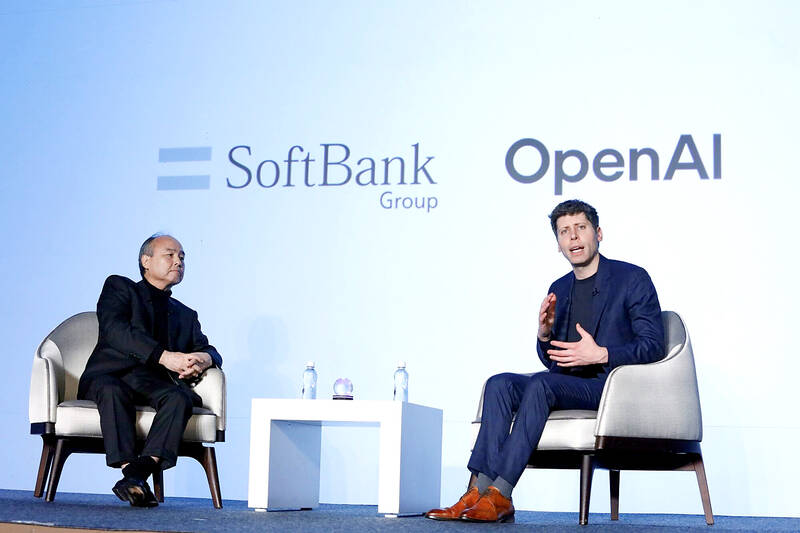Softbank Group Corp and OpenAI would create a joint venture to develop and sell artificial intelligence (AI) services to businesses across Japan, establishing one of the broadest efforts yet to sell the fast-growing start-up’s tools to enterprise customers outside of the US.
Billionaire Softbank founder Masayoshi Son and OpenAI CEO Sam Altman took to a Tokyo stage yesterday to outline their 50-50 collaboration. The venture, which would operate under Softbank’s telecom arm Softbank Corp, would hire 1,000 people from Softbank to market OpenAI products to industries from automakers to retailers.
Softbank said its own group companies — including LY Corp and PayPay Corp — would collectively use the US company’s tools to the tune of about US$3 billion a year.

Photo: Bloomberg
The tie-up underscores Softbank’s emergent role in driving AI development around the world, from leading the US$100 billion Stargate endeavor in the US to a years-long effort to build data centers in its home country of Japan.
“If more is better, we should do a lot. More brain is definitely better,” Son said.
He then made an apparent nod to the popularity of Chinese start-up DeepSeek’s cheaper AI model now challenging the premise underpinning the need for big AI spending.
“Some people say you can do small — compressed — but that’s just small,” he said.
Softbank joins a growing roster of tech leaders including Meta Platforms Inc and Microsoft Corp that are spending billions of dollars to lay the foundation for future AI development and use.
“The world is going to need so much compute,” Altman said, painting an imminent future of AI breakthroughs in healthcare and robotics.
“The most value will be made at the very front of that frontier,” he said.
Shares of Softbank closed up 0.5 percent yesterday, erasing losses at the beginning of the day.
Softbank is teaming up with OpenAI, Oracle Corp and Abu Dhabi-backed MGX on a multibillion-dollar project to build data centers and infrastructure in the US for the ChatGPT creator. The Stargate Project plans to spend at least US$500 billion over the next four years to build more computing power.
Japan, which largely missed the initial wave of growth from the Internet, cannot afford to lose another three decades, Son has said.
However, the resource-poor country remains constrained by the high price of imported oil and gas, while public sentiment is wary about nuclear power following the 2011 Fukushima meltdowns in a country that experiences hundreds of noticeable quakes a year.
Son yesterday brought a purple crystal onto the stage, an allusion to a metaphor he used when he bought Arm in 2016 as a means to see into the future of technology. The joint venture would market an enterprise AI called “Cristal intelligence” for Japanese companies, Son said.
Son and Altman were scheduled to meet with Japanese Prime Minister Ishiba Shigeru. The pair were joined at yesterday’s press briefing by Arm CEO Rene Haas and Junichi Miyakawa, head of Softbank’s telecom arm.

Taiwan Semiconductor Manufacturing Co (TSMC, 台積電) would not produce its most advanced technologies in the US next year, Minister of Economic Affairs J.W. Kuo (郭智輝) said yesterday. Kuo made the comment during an appearance at the legislature, hours after the chipmaker announced that it would invest an additional US$100 billion to expand its manufacturing operations in the US. Asked by Taiwan People’s Party Legislator-at-large Chang Chi-kai (張啟楷) if TSMC would allow its most advanced technologies, the yet-to-be-released 2-nanometer and 1.6-nanometer processes, to go to the US in the near term, Kuo denied it. TSMC recently opened its first US factory, which produces 4-nanometer

GREAT SUCCESS: Republican Senator Todd Young expressed surprise at Trump’s comments and said he expects the administration to keep the program running US lawmakers who helped secure billions of dollars in subsidies for domestic semiconductor manufacturing rejected US President Donald Trump’s call to revoke the 2022 CHIPS and Science Act, signaling that any repeal effort in the US Congress would fall short. US Senate Minority Leader Chuck Schumer, who negotiated the law, on Wednesday said that Trump’s demand would fail, while a top Republican proponent, US Senator Todd Young, expressed surprise at the president’s comments and said he expects the administration to keep the program running. The CHIPS Act is “essential for America leading the world in tech, leading the world in AI [artificial

REACTIONS: While most analysts were positive about TSMC’s investment, one said the US expansion could disrupt the company’s supply-demand balance Taiwan Semiconductor Manufacturing Co’s (TSMC, 台積電) new US$100 billion investment in the US would exert a positive effect on the chipmaker’s revenue in the medium term on the back of booming artificial intelligence (AI) chip demand from US chip designers, an International Data Corp (IDC) analyst said yesterday. “This is good for TSMC in terms of business expansion, as its major clients for advanced chips are US chip designers,” IDC senior semiconductor research manager Galen Zeng (曾冠瑋) said by telephone yesterday. “Besides, those US companies all consider supply chain resilience a business imperative,” Zeng said. That meant local supply would

BIG INVESTMENT: Hon Hai is building the world’s largest assembly plant for servers based on Nvidia Corp’s state-of-the-art AI chips, Jalisco Governor Pablo Lemus said The construction of Hon Hai Precision Industry Co’s (鴻海精密) massive artificial intelligence (AI) server plant near Guadalajara, Mexico, would be completed in a year despite the threat of new tariffs from US President Donald Trump, Jalisco Governor Pablo Lemus said. Hon Hai, also known as Foxconn Technology Group (富士康科技集團), is investing about US$900 million in what would become the world’s largest assembly plant for servers based on Nvidia Corp’s state-of-the-art GB200 AI chips, Lemus said. The project consists of two phases: the expansion of an existing Hon Hai facility in the municipality of El Salto, and the construction of a